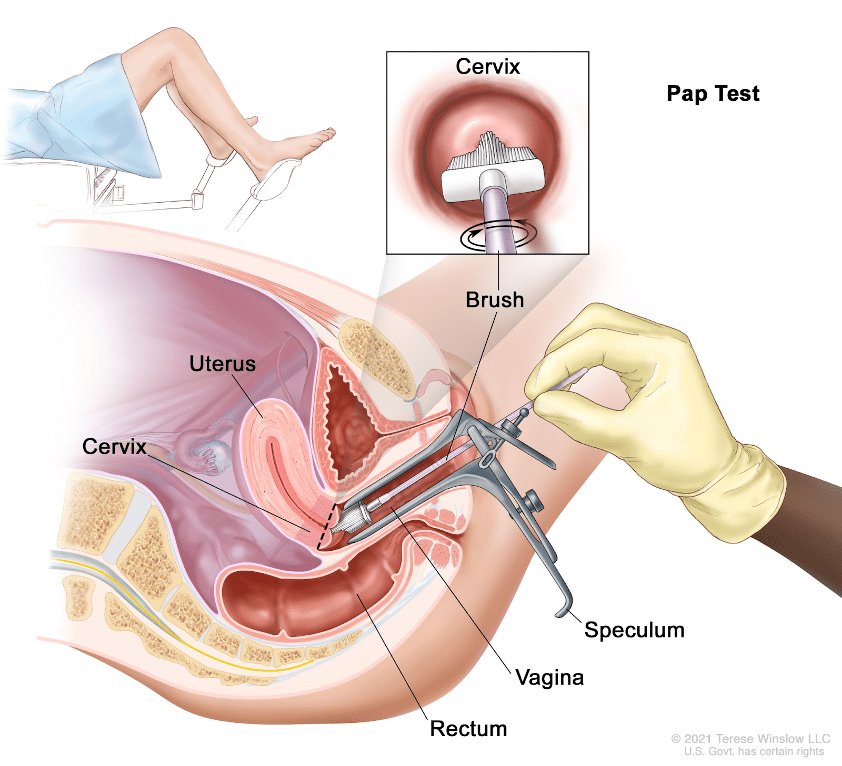You have likely heard of pap smears, and may have even had one before, but how much do you really know about this important screening exam? Keep reading to learn more and to better understand how your Diana Health providers partner with you to keep you healthy and significantly decrease your risk for cervical cancer.
What is a pap smear?
One part of cervical cancer screening is the pap smear, while the other is human papillomavirus testing. Depending on your age and your gynecologic history, you may have one or both of these done at regular intervals to decrease your risk of getting cervical cancer. For a pap smear to be done, you lie on an exam table, while a speculum is inserted into your vagina. When the speculum is opened slightly, your provider will view your cervix, which is the opening of the uterus to the vagina. They then use a small brush or another tool to sample some cells from the cervix and typically put the cells into a liquid to be sent to a lab for examination. These cells can then be examined (a pap test) to see if there are any abnormalities. If HPV testing is being done, the liquid is screened for high-risk HPV. Pap smears are quick and typically only take a couple of minutes.
What is cervical cancer?
Cervical cancer occurs when the cells that line the cervix (the lower part of the uterus where it opens to the vagina) become abnormal, typically due to infection with the human papilloma virus (HPV). Initially, the cells are typically mildly abnormal, but left untreated, they can sometimes become even more abnormal and grow deeper into the cervix. If left untreated, it can even spread to other parts of the body.
What is the Human Papiloma Virus (HPV)?
The human papilloma virus (HPV) is a virus that is transmitted sexually between partners. It is an extremely common virus. In fact, most sexually active women will become infected with HPV at some time in their life, though they may never have symptoms nor know that they are infected. There are different types of HPV. Some are low-risk for progression to cervical cancer while others are high-risk for progression. Your healthcare provider wants to know if you have high-risk HPV because although this infection typically goes away without treatment, occasionally, it can progress to cervical cancer.
How can I decrease my risk of getting cervical cancer?
If you are sexually active with a male, using a condom decreases your risk of getting HPV if he has the virus. Women with stronger immune systems (women who do not smoke and women without HIV) are more likely to clear the infection without treatment; however, this does not always occur. Since HPV typically has no symptoms and HPV infections are so common, this is why it is incredibly important to get cervical cancer screening that consists of a pap smear, HPV testing, or both. Cervical cancer typically takes five or more years to develop, which is why it is so important to follow the guidelines and be screened regularly. If you had abnormal cells that were progressing toward cervical cancer and were getting regular cervical cancer screening, the cells would likely be caught before progressing to cervical cancer so that they could be treated. That way, cervical cancer is hopefully prevented.
Why don’t I need pap smears every year?
According to the American College of Obstetricians and Gynecologist (ACOG) recommendations, 21-29 year old women should have pap smears every three years. Women in the 30-65 year old age group can have a pap smear plus HPV testing every 5 years, a pap smear every 3 years, or HPV testing every 5 years. It’s important to discuss the options for cervical cancer screening with your Diana Health provider. If you aren’t a Diana Health client, please reach out to your preferred healthcare provider to discuss pap smears with them.
Even though you may not need a pap smear every year, it’s still important to have an annual well woman exam, to check in on your overall health and wellness. Click here to learn more about what makes the Diana Health Annual Well Woman visit different and then book a visit at your nearest Diana Health location.
At Diana Health, your Certified Nurse Midwives, physicians, and other members of your Care Team care about you and your wellbeing. We are here to listen to your concerns, questions, symptoms, and educate you with a goal of engaging in shared decision making around your health. Together as a team, we can help you reduce the risk of ever getting cervical cancer, and if you have an abnormal pap smear, we are here to help you through that as well.
 Source
Source



